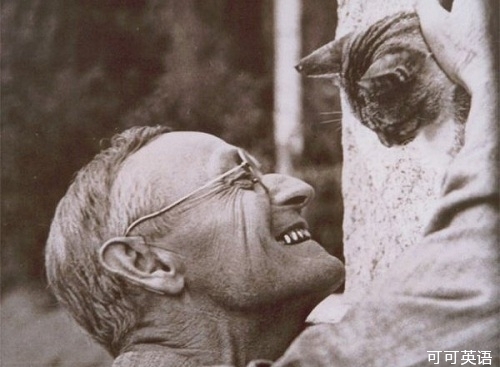(单词翻译:单击)
名著阅读
Siddhartha reached the large river in the forest, the same river over which a long time ago, when he had still been a young man and came from the town of Gotama, a ferryman had conducted him. By this river he stopped, hesitantly he stood at the bank. Tiredness and hunger had weakened him, and whatever for should he walk on, wherever to, to which goal? No, there were no more goals, there was nothing left but the deep, painful yearning to shake off this whole desolate dream, to spit out this stale wine, to put an end to this miserable and shameful life.
A hang bent over the bank of the river, a coconut-tree; Siddhartha leaned against its trunk with his shoulder, embraced the trunk with one arm, and looked down into the green water, which ran and ran under him, looked down and found himself to be entirely filled with the wish to let go and to drown in these waters. A frightening emptiness was reflected back at him by the water, answering to the terrible emptiness in his soul. Yes, he had reached the end. There was nothing left for him, except to annihilate himself, except to smash the failure into which he had shaped his life, to throw it away, before the feet of mockingly laughing gods. This was the great vomiting he had longed for: death, the smashing to bits of the form he hated! Let him be food for fishes, this dog Siddhartha, this lunatic, this depraved and rotten body, this weakened and abused soul! Let him be food for fishes and crocodiles, let him be chopped to bits by the daemons!
With a distorted face, he stared into the water, saw the reflection of his face and spit at it. In deep tiredness, he took his arm away from the trunk of the tree and turned a bit, in order to let himself fall straight down, in order to finally drown. With his eyes closed, he slipped towards death.
Then, out of remote areas of his soul, out of past times of his now weary life, a sound stirred up. It was a word, a syllable, which he, without thinking, with a slurred voice, spoke to himself, the old word which is the beginning and the end of all prayers of the Brahmans, the holy "Om", which roughly means "that what is perfect" or "the completion". And in the moment when the sound of "Om" touched Siddhartha's ear, his dormant spirit suddenly woke up and realized the foolishness of his actions.
Siddhartha was deeply shocked. So this was how things were with him, so doomed was he, so much he had lost his way and was forsaken by all knowledge, that he had been able to seek death, that this wish, this wish of a child, had been able to grow in him: to find rest by annihilating his body! What all agony of these recent times, all sobering realizations, all desperation had not brought about, this was brought on by this moment, when the Om entered his consciousness: he became aware of himself in his misery and in his error.
Om! he spoke to himself: Om! and again he knew about Brahman, knew about the indestructibility of life, knew about all that is divine, which he had forgotten.
But this was only a moment, flash. By the foot of the coconut-tree, Siddhartha collapsed, struck down by tiredness, mumbling Om, placed his head on the root of the tree and fell into a deep sleep.
席特哈尔塔来到森林中的一条大河边,这正是当年他年轻时从戈塔马那个城里出来,一个船夫为他摆渡的那条河。他在河边停下,犹豫不决地站在河岸上。疲劳和饥饿已经使得他虚弱不堪,他干吗还继续走呢?他前往何处,奔什么目标呢?不,已经没有目标了,只有这种深深的痛苦的渴望:甩掉这乱七八糟的梦境,吐掉这变了味的酒,结束这糟糕的可耻的生活!
从河岸上探出一棵树,弯着伸向河面,那是一棵椰子树。席特哈尔塔让肩膀靠在树干上,用一只胳臂搂住树干,俯视着身下流过的碧绿的河水。他往下看,感到心中涌动着这个愿望:松开手,让自己沉溺到水里去。从水中映也一种可怕的空虚,而他心中的可怕的空虚则与之呼应。是的,他要完蛋了。留给他的出路就是毁灭自己,砸烂自己生活的失败产物,丢弃它,把它丢到幸灾乐祸的神灵脚下。为正是他所渴望的巨大突破:死亡,毁掉他所憎恶的形体!但愿水中的鱼把他吃掉,把席特哈尔塔这条狗、这个疯子、这个腐朽的身躯、这颗衰微和滥用了的灵魂吃掉!但愿鱼类和鳄鱼把他吃掉,但愿恶魔把他撕成碎片!
他面容扭曲地呆望着水面,看见了映出的那张脸,便朝它吐口水。他疲惫不堪,让胳臂松开树干,轻了一下身子,以便垂直地落进水中,最终葬身水底。他沉下去,闭着眼睛,迎向死亡。
这时,从他心灵深处的偏僻角落里,从他这疲倦一生的历历往事中,传来了一个声音。那是一个字,一个音节,他不假思索就喃喃地念了出来。那正是所有婆罗门在祈祷的开头和结尾时都用的古字,那个神圣的“唵”字,意思是“功德圆满”或“完美无瑕”。就在这声“唵”传入席特哈尔塔耳中的一刹那,他那沉睡的心灵突然苏醒了,他看清了自己行为的愚蠢。
席特哈尔塔深感震惊。他现实的境况就是这样,这么无可救药,误入歧途,背离了一切真敌国,以至于他想自寻短见,而这个愿望,这个孩子般的愿望,却在他心中变大起来:不惜毁灭自己的肉体来求得安宁!这最后时刻的全部痛苦、全部醒悟和全部绝望没能实现的东西,却在“唵”闯入他的意识这一瞬间完成了:他在自己的愁苦和迷乱中认识了自己。
“唵!”他喃喃自语着,“唵!”他想起婆罗门,想起生活的坚不可摧,想起了他已经淡忘的所有神圣的东西。
但这仅只是一刹那,像一道闪电。席特哈尔塔倒在了那棵椰子树下,把头枕在树根上,陷入了沉沉的梦乡。
背景阅读

本书简介:
古印度贵族青年悉达多英俊聪慧,拥有人们羡慕的一切。为了追求心灵的安宁,他孤身一人展开了求道之旅。他在舍卫城聆听佛陀乔答摩宣讲教义,在繁华的大城中结识了名妓伽摩拉,并成为一名富商。心灵与肉体的享受达到顶峰,却让他对自己厌倦、鄙弃到极点。在与伽摩拉最后一次欢爱之后,他抛弃了自己所有世俗的一切,来到那河边,想结束自己的生命。在那最绝望的一刹那,他突然听到了生命之河永恒的声音……经过几乎一生的追求,悉达多终于体验到万事万物的圆融统一,所有生命的不可摧毁的本性,并最终将自我融入了瞬间的永恒之中。
作者简介:
赫尔曼·黑塞(Hermann Hesse,1877.7.2-1962.8.9)德国作家。1923年46岁入瑞士籍。1946年获诺贝尔文学奖。1962年于瑞士家中去世。爱好音乐与绘画,是一位漂泊、孤独、隐逸的诗人。黑塞的诗有很多充满了浪漫气息,从他的最初诗集《浪漫之歌》的书名,也可以看出他深受德国浪漫主义诗人的影响,以致后来被人称为“德国浪漫派最后的一个骑士”。主要作品有《彼得·卡门青》、《荒原狼》、《东方之行》、《玻璃球游戏》等。
主要生平及创作
出生于德国西南部的小城卡尔夫的一个牧师家庭。自幼在浓重的宗教气氛中长大,1891年,他通过“邦试”,考入毛尔布隆神学校。由于不堪忍受经院教育的摧残,半年后逃离学校。这期间他游历许多城市,从事过多种职业。
在比较广泛地接受东西方文化熏陶之后,1904年,黑塞发表了长篇小说《彼得·卡门青特》,一举成名,从此成为专业作家。这一年他与玛丽结婚,移居巴登湖畔,埋头写作,1906年发表了长篇小说《在轮下》。这一时期的创作以浪漫主义诗歌、田园诗风格的抒情小说和流浪汉小说为主,作品洋溢着对童年和乡土的思念之情,充满对广大自然和人类的爱,同时也表现了青年人的精神苦闷与追求。
第一次世界大战后,黑塞的创作发生了明显的变化,他醉心于尼采哲学,求助于印度佛教和中国的老庄哲学,并对荣格的精神分析产生了深厚的兴趣。他试图从宗教、哲学和心理学方面探索人类精神解放的途径。这时期的长篇小说有《克努尔普》(1916)、《德米安》(1919)、《席特哈尔塔》(1922)、《荒原狼》(1927)和《纳尔齐斯与歌尔德蒙》(1930)等。这些书深受西方读者的喜爱,得到极高的评价,其中《荒原狼》曾轰动欧美,被托马斯·曼誉为德国的《尤利西斯》。
30年代后,法西斯在德国猖獗,黑塞对社会前途陷入深深的怀疑与绝望之中,但他仍不倦地从东西方宗教与哲学中寻求理想世界,《东方之行》(1932)、《玻璃球游戏》(1943)正是这一时期追求与探索的结晶。
黑塞被雨果·巴尔称为德国浪漫派最后一位骑士,这说明他在艺术上深受浪漫主义诗歌的影响。他热爱大自然,厌倦都市文明,作品多采用象征手法,文笔优美细腻;由于受精神分析影响,他的作品着重在精神领域里进行挖掘探索,无畏而诚实地剖析内心,因此他的小说具有心理的深度。1946年,"由于他的富于灵感的作品具有遒劲的气势和洞察力,也为崇高的人道主义理想和高尚风格提供一个范例",黑塞获诺贝尔文学奖。


